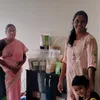With over 250 artisans across 10 states, how Ritu Oberoi plans to weave in handloom sarees into our wardrobes
For Sarees is an online platform that showcases the collection of sarees by weavers and handlooms from across India.
After working as a sales professional in the media and advertising industry for several years, Ritu Oberoi decided to take a sabbatical and travel across the country.
“While travelling to craft villages, I was startled to see so much of skill and talent, but people struggled to sell these products beyond certain exhibitions. I had been an ardent saree lover myself and could relate to a similar struggle of buying pure handlooms in metros. I could understand the gap in the handloom industry,” says Ritu.
Using all of her sales experience and training, Ritu decided to start For Sarees in 2018 in Mumbai to help bridge the gap. The company aims to be a socially-driven business enterprise that works closely with weavers and artisans in rural India, bringing skillfully crafted sarees and other products to urban consumers.

Ritu Oberoi
“Our artisans are our core team and our projects are designed to solve two big problems the industry faces – creating rural employment and women empowerment. We have our ongoing projects in Kutch, Chanderi village, Shantiniketan, Yadadri , Ajrakhpur , Sambalpur, Chaubundi in Rajasthan, Burdwan, and many more villages across the country.”
For Sarees has been running a Kantha project for over two years in villages near Shantiniketan (West Bengal). It aims to empower women artisans and provide additional income to their household.
Sales to fashion
“Since I am not from the fashion industry, it took me a lot of study and initial research to get started. But once the project took off, it has been an enthralling experience each day,” says Ritu. She adds that at the age of 41, she had felt that the corporate job had given her enough training and expertise for her to start up. Her last role before her sabbatical was that of an Account Director, Ad Sales at ABP News Network.
“From a white-collared job to doing grassroot work, it was a huge transition. And since I wasn’t from the industry, it took a lot of research, study, and determination to build up the brand as well as the community,” says Ritu.
The task for the team has been to ensure a stable monthly income for these artisans. It was also important to ensure that there were no middlemen in the entire chain as it provides a better income for the artisan and a better price for the end consumer.
“We also work hard to bring products from each range for the consumer so that the notion that handloom products are expensive is broken. We are proudly associated with 250 weaver families (ancillary workers not included here) spread across 10 states and working on multiple clusters in each state, and our projects indirectly impact many others,” says Ritu.
Each handmade product has a different cost and production timeline on the basis of the intricacies involved. The minimum time to make a handloom saree is one week. The intricate motifs may take up to three weeks, from yarn to saree.
For Sarees aims to popularise handlooms in urban cities through various social media campaigns. This ensures the space and the recognition that handloom products deserve. It is also looking to further create employment in rural areas where there’s immense skill and talent.
Working closely with artisans
“We also work with artisans very closely to upskill them with latest trends. Our Shantiniketan project empowers and works with women from nearby villages who are well equipped with art of making kantha sarees. They are the backbone of our much popular cotton kanthas made for the working women in metros,” says Ritu.
Also, as a development project, For Sarees have been engaging artisans to produce new products by intervening at the design level.
“During the lockdown, we co-created a unique charpoy handicraft that’s selling superbly well on social media as a home décor/balcony accessory. These are just a few ways to engage the artisans when there are few projects and still ensures that their incomes don’t suffer. We are optimistic about the fact that online shopping would be most preferred in the post-COVID-19 world, and we are preparing ourselves for same,” she adds.
The team is looking to add other product categories like stoles, scarves, home decor, and utility gifts. For the handloom sarees, the team targets to work with five new clusters each year and onboard more weavers from the existing clusters so that they can offer a variety to their repeat customers.
The core customers are mostly women working in corporates across the globe in the 30-35 age group. The products range from Rs 1,200 - Rs 12,000, as per the intricacy of the art and craft involved.
“I have a vision to popularise the Indian traditional crafts in urban and modern setups. And we have proudly done so with For Sarees. Also, what sets us apart is our effort to organise developmental projects in the clusters while creating handloom marvels,” says Ritu.
Edited by Kanishk Singh









